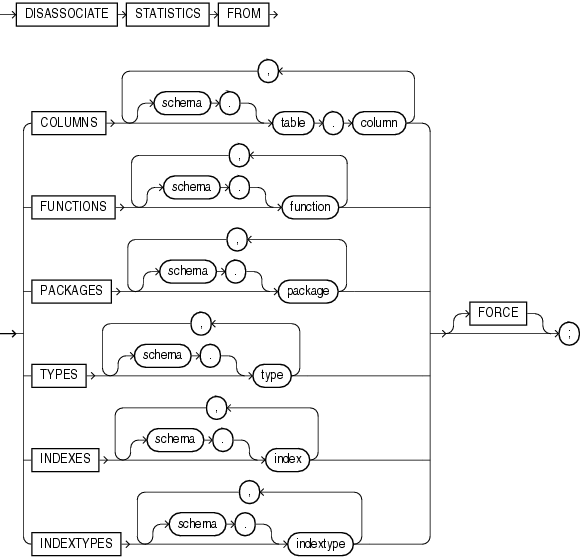| Oracle® Database SQL Language Reference 11g Release 2 (11.2) Part Number E26088-03 |
|
|
PDF · Mobi · ePub |
| Oracle® Database SQL Language Reference 11g Release 2 (11.2) Part Number E26088-03 |
|
|
PDF · Mobi · ePub |
Use the DISASSOCIATE STATISTICS statement to disassociate default statistics or a statistics type from columns, standalone functions, packages, types, domain indexes, or indextypes.
See Also:
ASSOCIATE STATISTICS for more information on statistics type associationsTo issue this statement, you must have the appropriate privileges to alter the underlying table, function, package, type, domain index, or indextype.

FROM COLUMNS | FUNCTIONS | PACKAGES | TYPES | INDEXES | INDEXTYPES
Specify one or more columns, standalone functions, packages, types, domain indexes, or indextypes from which you are disassociating statistics.
If you do not specify schema, then Oracle Database assumes the object is in your own schema.
If you have collected user-defined statistics on the object, then the statement fails unless you specify FORCE.
Specify FORCE to remove the association regardless of whether any statistics exist for the object using the statistics type. If statistics do exist, then the statistics are deleted before the association is deleted.
Note:
When you drop an object with which a statistics type has been associated, Oracle Database automatically disassociates the statistics type with theFORCE option and drops all statistics that have been collected with the statistics type.Disassociating Statistics: Example This statement disassociates statistics from the emp_mgmt package. See Oracle Database PL/SQL Language Reference for the example that creates this package in the hr schema.
DISASSOCIATE STATISTICS FROM PACKAGES hr.emp_mgmt;